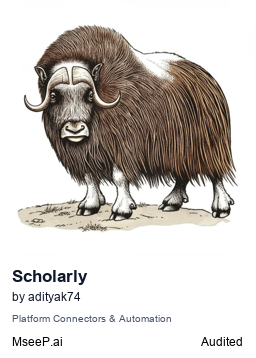[](https://mseep.ai/app/adityak74-mcp-scholarly)
# mcp-scholarly MCP server
[](https://smithery.ai/server/mcp-scholarly)
A MCP server to search for accurate academic articles. More scholarly vendors will be added soon.


<a href="https://glama.ai/mcp/servers/aq05b2p0ql"><img width="380" height="200" src="https://glama.ai/mcp/servers/aq05b2p0ql/badge" alt="Scholarly Server MCP server" /></a>

## Components
### Tools
The server implements one tool:
- search-arxiv: Search arxiv for articles related to the given keyword.
- Takes "keyword" as required string arguments
## Quickstart
### Install
#### Claude Desktop
On MacOS: `~/Library/Application\ Support/Claude/claude_desktop_config.json`
On Windows: `%APPDATA%/Claude/claude_desktop_config.json`
<details>
<summary>Development/Unpublished Servers Configuration</summary>
```
"mcpServers": {
"mcp-scholarly": {
"command": "uv",
"args": [
"--directory",
"/Users/adityakarnam/PycharmProjects/mcp-scholarly/mcp-scholarly",
"run",
"mcp-scholarly"
]
}
}
```
</details>
<details>
<summary>Published Servers Configuration</summary>
```
"mcpServers": {
"mcp-scholarly": {
"command": "uvx",
"args": [
"mcp-scholarly"
]
}
}
```
</details>
or if you are using Docker
<details>
<summary>Published Docker Servers Configuration</summary>
```
"mcpServers": {
"mcp-scholarly": {
"command": "docker",
"args": [
"run", "--rm", "-i",
"mcp/scholarly"
]
}
}
```
</details>
### Installing via Smithery
To install mcp-scholarly for Claude Desktop automatically via [Smithery](https://smithery.ai/server/mcp-scholarly):
```bash
npx -y @smithery/cli install mcp-scholarly --client claude
```
## Development
### Building and Publishing
To prepare the package for distribution:
1. Sync dependencies and update lockfile:
```bash
uv sync
```
2. Build package distributions:
```bash
uv build
```
This will create source and wheel distributions in the `dist/` directory.
3. Publish to PyPI:
```bash
uv publish
```
Note: You'll need to set PyPI credentials via environment variables or command flags:
- Token: `--token` or `UV_PUBLISH_TOKEN`
- Or username/password: `--username`/`UV_PUBLISH_USERNAME` and `--password`/`UV_PUBLISH_PASSWORD`
### Debugging
Since MCP servers run over stdio, debugging can be challenging. For the best debugging
experience, we strongly recommend using the [MCP Inspector](https://github.com/modelcontextprotocol/inspector).
You can launch the MCP Inspector via [`npm`](https://docs.npmjs.com/downloading-and-installing-node-js-and-npm) with this command:
```bash
npx @modelcontextprotocol/inspector uv --directory /Users/adityakarnam/PycharmProjects/mcp-scholarly/mcp-scholarly run mcp-scholarly
```
Upon launching, the Inspector will display a URL that you can access in your browser to begin debugging.